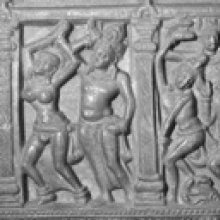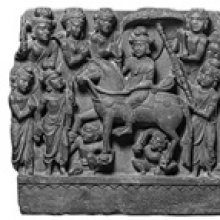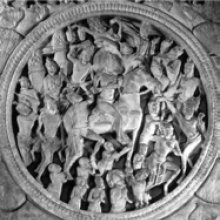Departure: 1 definition
Introduction:
Departure means something in Hinduism, Sanskrit. If you want to know the exact meaning, history, etymology or English translation of this term then check out the descriptions on this page. Add your comment or reference to a book if you want to contribute to this summary article.
Images (photo gallery)
(+1 more images available)
In Hinduism
Yoga (school of philosophy)
Source: ORA: Amanaska (king of all yogas): A Critical Edition and Annotated Translation by Jason BirchThe Departure (of the breath) is denoted by the Sanskrit term Niṣkrānti, according to the Vivekamārtaṇḍa 94ab-95.—Accordingly, while discussing the connection between mind and breath: “So long as the breath is held in the body, then the mind is supportless [in meditation ...]. So long as the breath is in the body, the soul is not released [from it]. The [breath’s] departure (niṣkrānti) is death. Therefore, one should restrain the breath [in the body]”.

Yoga is originally considered a branch of Hindu philosophy (astika), but both ancient and modern Yoga combine the physical, mental and spiritual. Yoga teaches various physical techniques also known as āsanas (postures), used for various purposes (eg., meditation, contemplation, relaxation).
See also (Relevant definitions)
Full-text (+291): Nirgama, Prasthanika, Prayana, Vyapagama, Prasthana, Vigama, Pranotkramana, Prayanakala, Apagama, Prahapana, Apasarana, Utkramana, Pareti, Niryati, Majjava, Apaya, Mithahprasthana, Prakarshagamana, Samprayana, Gamanantaraya.
Relevant text
Search found 192 books and stories containing Departure; (plurals include: Departures). You can also click to the full overview containing English textual excerpts. Below are direct links for the most relevant articles:
The Quest for Self in Nissim Ezekiel’s Poetry < [January – March, 2006]
Some Problems for Criticism in “Macbeth” < [April – June 1992]
Shaji’s Departure from Ahmednagar < [January – March and April – June, 1995]
Apadana commentary (Atthakatha) (by U Lu Pe Win)
Commentary on the stanza on service (sevā) < [Commentary on biography of Silent Buddhas (Paccekabuddha)]
Commentary on the stanza beginning with addhā-pasamsā (certainly praise) < [Commentary on biography of Silent Buddhas (Paccekabuddha)]
Commentary on the stanza on sahāya < [Commentary on biography of Silent Buddhas (Paccekabuddha)]
Brahma Sutras (Shankaracharya) (by George Thibaut)
IV, 2, 13 < [Fourth Adhyāya, Second Pāda]
IV, 2, 7 < [Fourth Adhyāya, Second Pāda]
IV, 2, 12 < [Fourth Adhyāya, Second Pāda]
Brahma Sutras (Nimbarka commentary) (by Roma Bose)
Brahma-Sūtra 4.2.12 < [Adhikaraṇa 5 - Sūtras 7-13]
Brahma-Sūtra 4.2.7 < [Adhikaraṇa 5 - Sūtras 7-13]
Brahma-Sūtra 2.3.19 < [Adhikaraṇa 9 - Sūtras 19-31]
Brahma Sutras (Shankara Bhashya) (by Swami Vireshwarananda)
Chapter IV, Section II, Adhikarana IV < [Section II]
Chapter IV, Section II, Adhikarana VI < [Section II]
Chapter IV, Section II, Adhikarana IX < [Section II]
Brahma Sutras (Ramanuja) (by George Thibaut)
Sutra 4.2.7 < [Fourth Adhyaya, Second Pada]
Sutra 3.3.29 < [Third Adhyaya, Third Pada]
Sutra 1.4.22 < [First Adhyaya, Fourth Pada]
Related products











